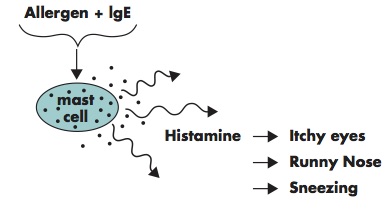Say Goodbye (or Good Riddance) to your Allergies!
Eliminating Allergies Without Allergy Shots
Dr. Sheldon Bjorgaard, ND
As the weather warms and the birds start singing again, furry creatures emerge from their winter hibernation. Nature is all aglow with greener grasses, flowers in bloom and trees reviving themselves. Everything is beautiful and bright. Until…a slight sniffle..an itch at the corner of the eye..a dry throat..Ah our familiar spring friend ALLERGIES, colloquially referred to as Hay Fever.
As spring and summer approach us, one in 6 Canadians will be forced to spend more time indoors because of dreaded allergy symptoms. Depending on the nature and severity of ones seasonal allergies the season can last all the way into the early fall. That’s a lot of missing out. Don’t let this be you.
Why do I have Allergies?
The all too common allergic symptoms of a runny nose, itchy, watery eyes and dry throat (medically termed “allergic rhinitis”) are the result of an immune reaction. In allergic individuals the immune system is over active, launching a defensive assault against relatively non-threatening substances. This reaction normally keeps us safe from external pathogens, but in people who suffer from allergies it is a clear case of “too much of a good thing”.
There is some evidence of a genetic component to allergies, but this doesn’t explain the increasing incidence of environmental allergies in the developed world. One hypothesis among researchers calls into question our overly hygienic lifestyles. Growing up in sanitary conditions where we are rarely exposed to allergens compared to 100 years ago, our immune systems seem to be more hyper-reactive when they do encounter them. This hypothesis is further supported by the increased allergy rates of urban city dwellers compared with those who live in the countryside. Regardless of the mechanisms at play, the important thing to know is that those bothersome symptoms we experience are due to an over active immune response that is difficult to control.
The Biology of Allergies
When our bodies are exposed to particular allergens (such as pollen) in the air, we breathe them in passively. Immune cells soon detect the allergen as a threat. This leads to a series of cellular reactions ultimately leading to the release of a chemical mediator called histamine. Histamine is the main culprit that causes allergic symptoms such as a runny nose, sneezing, and watery, itchy eyes.

How are Allergies Treated?
It therefore follows that the mainstay of treatment for seasonal and environmental allergies are medications that block histamine from acting in the body, thus they are called Anti-Histamines. These medications can be effective for symptomatic relief, but sometimes they are not enough. Some people may become tolerant, leading to the need for increased dosages. In addition some anti-histamines can cause drowsiness. Other allergy medications include oral or nasal corticosteroids that blunt the body’s immune response. While they may be effective for temporary symptom relief, none of these treatments address the root cause of the allergic response.
Fortunately there are treatments available that can actually de-sensitize a person from the allergic response over time, effectively “curing” allergies! The most common and well known are allergy shots administered on a regular basis, as a kind of allergy vaccine. The downside to this treatment is that the shots must be done on a regular schedule in order to work effectively. They may also be painful and inconvenient, interfering with work, travel plans and other events.
Not many people are aware that a similar treatment is now available in “allergy drops” instead of injections. This is called Sublingual Immunotherapy, or SLIT for short. It involves the regular self-administration of drops under the tongue that slowly but surely de-sensitize the immune system to the allergies.
No more allergy shots!
Sublingual Immunotherapy (SLIT)
How does it work?
Similar to allergy shots, SLIT works by providing the body with very small amounts of the allergen that you are allergic to. Testing is done to confirm each particular allergen, and a custom made mixture is prepared for the patient. All it requires is a few drops daily under the tongue, which allows your body to slowly adapt to the exposure without over-reacting and causing symptoms. Over time, the concentration of allergens is increased as your immune system becomes less sensitive. In a way it re-trains your immune system to “behave” properly in the presence of allergens such as pollens, grasses, moulds, dog and cat hair. With long-term treatment, allergies should be completely eliminated, and symptoms should not occur at all.
Is SLIT Safe for children?
SLIT is safe for long term use in both children and adults to address the root cause of allergies and eliminate them for good. The World Health Organization (WHO) has even endorsed SLIT as a viable alternative to conventional allergy shots.
Does SLIT really work?
Yes, and numerous studies support this. Many organizations including the World Allergy Organization (WAO) and the American Academy of Allergy, Asthma, and Immunotherapy (AAAAI) support the safety and efficacy of SLIT for the long-term resolution of allergies and asthma.
How do I start SLIT?
Book an appointment for allergy testing, which will allow your doctor to identify the particular allergens causing you the most trouble. A custom made vial will then be prepared by a compounding pharmacy for your daily use. Check in visits every few months to monitor your progress and re-fill your prescription are recommended for best results.
Sign up for Our Newsletter
References:
-
Sublingual immunotherapy: World Allergy Organization position paper 2013 update. World Allergy Organization Journal 2014 7:51.
-
Sublingual Immunotherapy for the Treatment of Allergic Rhinoconjunctivitis and Asthma. A Systematic Review. Sandra Y. Lin, MD; Nkiruka Erekosima, MD, MPH; Julia M. Kim, MD, MPH; et al. JAMA. 2013;309(12):1278-1288.
-
aaaai.org/conditions-and-treatments/library/allergy-library/sublingual-immunotherapy-for-allergic-rhinitis
-
cochrane.org/CD002893/ENT_sublingual-immunotherapy-for-allergic-rhinitis-including-hay-fever







